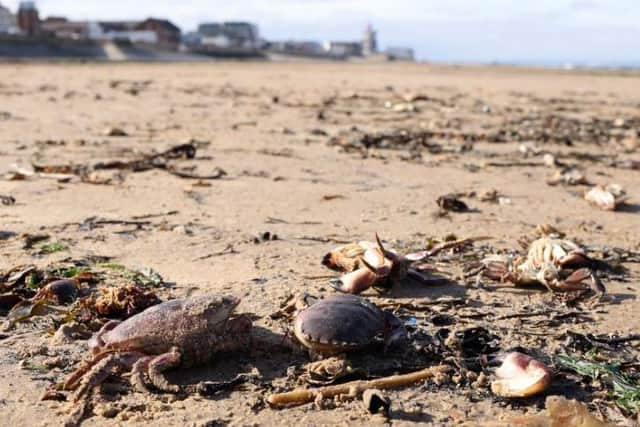North Sea crab deaths: MP calls for more information and regular testing to avoid 'ecological catastrophe'
Alex Cunningham, Labour MP for Stockton South, said a recent report into the mass die-offs on the Teesside and North Yorkshire shores left “more questions than answers”. He said there should now be regular testing and monitoring of water and marine life.
He responded to the recent Centre for Environment, Fisheries and Aquaculture Science (Cefas) report which found an industrial chemical was unlikely to be the cause of the die-off which blighted the Teesside and North Yorkshire shores and devastated the local fishing industry. Dying crustaceans were washed ashore along the coast from Hartlepool down to Whitby in October to December 2021.
Advertisement
Hide AdAdvertisement
Hide AdResearch by academics, backed by the fishing industry, suggested the incident could have been caused by industrial pollutant pyridine, possibly from dredging in the mouth of the River Tees to maintain channels for port traffic. But an independent panel found in January this year that this was “exceptionally unlikely” and it was “about as likely as not” a potential disease or parasite caused the crab deaths.


Cefas’ findings, reported in early November, have supported the conclusion that it was very unlikely pyridine was the cause. It used a new method to test for pyridine and re-analysed samples collected during the mass mortality event. This found low levels of pyridine in crab tissue and sediments.
Mr Cunningham said the Department for Environment, Food and Rural Affairs (Defra) commissioned Cefas to test for pyridine and re-examine the crab tissue samples after campaigning by him, local fishers and other campaigners. Now he has written to Fisheries Minister Mark Spencer with three requests.
He has asked for an understanding of the ongoing work to find the definitive answer to the crustacean die-offs, open access to the samples to enable any future, independent research, and a commitment from Defra for regular testing, monitoring and reporting regime of seas and sealife.
Advertisement
Hide AdAdvertisement
Hide AdMr Cunningham said: “I’m grateful to those working on the Crustacean Mortality Expert Panel and indeed to everyone who has been trying to find the cause of this ecological catastrophe. Whether ministers like it or not however, the recent report leaves more questions than answers, particularly around the definitive cause of the die-offs.
“The fishing industry and local people deserve to know the reasons behind the die-offs and they need to know that their government is doing all it can to avoid a repeat of this ecological catastrophe, protect our natural environment, and support local fishers.”
Defra has been contacted for a comment.